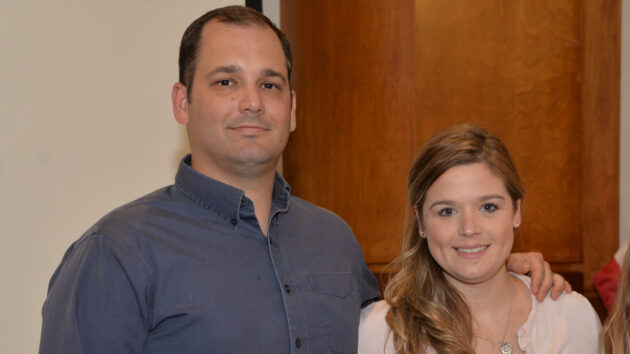Family Finds Meaningful Way to Remember Infant Daughter

Following the loss of their daughter shortly after birth, a Saratoga Springs family has ensured her legacy will live to support others, and they hope their story inspires others to do the same.
Emmalee and Nick Wolfe became concerned when they learned at just 12 weeks that doctors were worried about their baby’s growth. By 14 weeks, they were sent to Albany Med’s Maternal Fetal Medicine specialists, where doctors diagnosed their baby with thanatophoric skeletal dysplasia, a rare genetic fetal anomaly.
Although they were devastated, the Wolfes knew immediately that their baby had a purpose to carry out. They inquired about organ donation and with the help of social workers from Albany Med’s Journeys Palliative Care team and representatives from the Center for Donation and Transplant, began making arrangements to donate their baby’s organs in hopes of saving others.
“We knew her genetic disorder, the size of her organs, or any other factors might not make this possible, but we had some of the hope back that had gone missing,” said Emmalee. “We felt like things made more sense. We felt like there was a purpose.”
Emmalee unexpectedly went into preterm labor at 28 weeks. Iris Elizabeth Wolfe was born at 8 p.m. April 23 and spent the 97 minutes of her life surrounded by love. Although her organs could not be used for transplantation due to their size, her parents were offered a different option: to donate her organs for research.
The Wolfes are sharing their story in hopes of educating others who might face similar situations about the option of organ donation for both transplantation and research, and the enduring legacy it provides following neonatal loss.
According to the International Institute for the Advancement of Medicine, approximately 500,000 infants are born prematurely each year. Donations such as Iris’s can help scientists research immature lung function, inflammation and infection that may occur, as well as other important research.
“We learned that Iris was only the third baby in this area to donate her organs for research. We learned later that less than 100 infants nationwide had donated organs. We wondered why this was and we learned that parents don’t know it is an option,” Emmalee said. “It was then we knew that we wanted to work to help bring awareness to this option because knowing Iris would help countless other babies changed the way that we saw our whole experience. We knew our baby was making a bigger difference than we probably ever will, and we are so thankful for that.”
